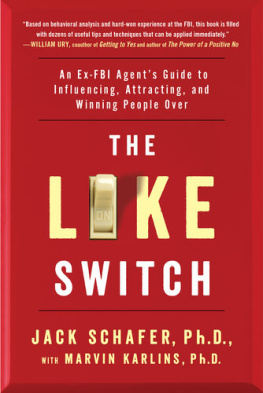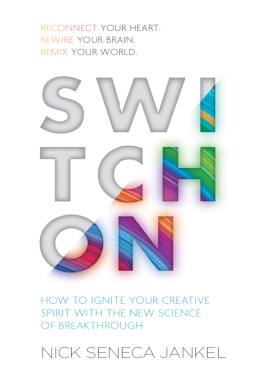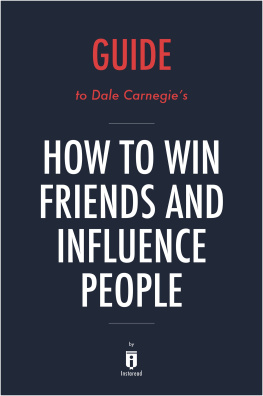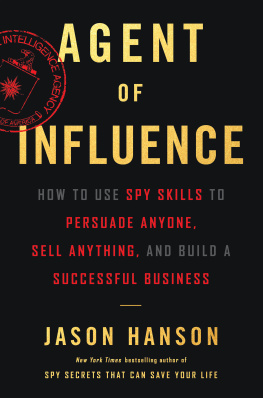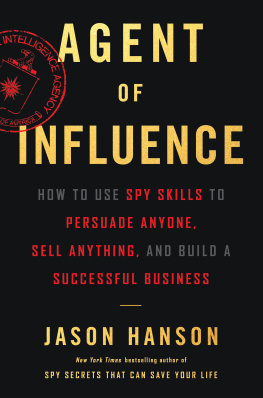We hope you enjoyed reading this Touchstone eBook.
Join our mailing list and get updates on new releases, deals, bonus content and other great books from Touchstone and Simon & Schuster.
C LICK H ERE T O S IGN U P
or visit us online to sign up at
eBookNews.SimonandSchuster.com
Thank you for downloading this Touchstone eBook.
Join our mailing list and get updates on new releases, deals, bonus content and other great books from Touchstone and Simon & Schuster.
C LICK H ERE T O S IGN U P
or visit us online to sign up at
eBookNews.SimonandSchuster.com

Touchstone
A Division of Simon & Schuster, Inc.
1230 Avenue of the Americas
New York, NY 10020
www.SimonandSchuster.com
Copyright 2015 by John Schafer, Ph.D. and Marvin Karlins, Ph.D.
The opinions expressed in this book are those of the author and not those of the Federal Bureau of Investigation (FBI).
All rights reserved, including the right to reproduce this book or portions thereof in any form whatsoever. For information address Touchstone Subsidiary Rights Department, 1230 Avenue of the Americas, New York, NY 10020.
First Touchstone trade paperback edition January 2015
TOUCHSTONE and colophon are registered trademarks of Simon & Schuster, Inc.
The Simon & Schuster Speakers Bureau can bring authors to your live event. For more information or to book an event contact the Simon & Schuster Speakers Bureau at 1-866-248-3049 or visit our website at www.simonspeakers.com.
Interior design by Ruth Lee-Mui
Cover design by David High
Cover art by ArtBitz/Shutterstock
Photographs by Dave and Lynda Mills of Dave Mills Photography, Lancaster, California
Library of Congress Cataloging-in-Publication Data
Schafer, Jack.
The like switch : an exFBI agents guide to influencing, attracting, and winning people over / Jack Schafer, Marvin Karlins.
pagescm.(A Touchstone book)
1.Friendship.2.Interpersonal attraction.3.Influence (Psychology)4.Interpersonal relations.I.Karlins, Marvin.II.Title.
BF575.F66S33 2015
158.2'5dc232014009121
ISBN 978-1-4767-5448-2
ISBN 978-1-4767-5450-5 (ebook)
To my wife, Helen, a woman overflowing with love, strength of character, and, above all, patience for enduring my antics for over three decades of marriage.
JACK SCHAFER
To my wife, Edyth, and daughter, Amber: for who you are, for what youve accomplished, for your love that has enriched so many lives.
MARVIN KARLINS
CONTENTS
THE LIKE SWITCH
How to Turn People On to You
When you hear FBI, you likely dont think the Friendly Bureau of Investigation. But my twenty years as an agent specializing in behavioral analysis enhanced my ability to quickly read people and gave me a unique understanding of human nature and shared human behaviors. And my work, which ranged from convincing people to spy on their own country to identifying perpetrators and convincing them to confess, allowed me to develop many incredibly powerful methods for getting people to trust me, often without me saying a word. In my role as behavioral analyst for the FBIs Behavioral Analysis Program, I developed strategies to recruit spies and make friends out of sworn foes. In other words, I developed specific skills and techniques that could turn an enemy of the United States into a friend who was willing to become a spy for America.
My profession boiled down to getting people to like me. My work with Vladimir (I have changed the names and identifying characteristics of those I discuss and have created some composites to best illustrate what my work has demonstrated) illustrates this point well.
Vladimir had illegally entered the United States to commit espionage. He was caught in possession of classified defense documents. As an FBI Special Agent, I was assigned to interview Vladimir. At our first meeting he made a vow not to speak to me under any circumstances. I then began the process of countering his defiance by simply sitting opposite him and reading a newspaper. But at a carefully planned time, I deliberately folded the newspaper and left without saying a word. Day after day and week after week I sat across from him and read the newspaper while he remained mute, handcuffed to a nearby table.
Finally, he asked why I kept coming daily to see him. I folded the newspaper, looked at him, and said, Because I want to talk to you. I immediately returned the newspaper to the upright position and continued reading, ignoring Vladimir. After a while, I got up and left without saying another word.
On the following day, Vladimir again asked me why I came every day and read the newspaper. I again told him that I came because I wanted to talk to him. I sat down and opened the newspaper. A few minutes later, Vladimir said, I want to talk. I put the newspaper down and said, Vladimir, are you sure you want to talk to me? When we first met, you told me that you would never speak to me. Vladimir replied, I want to talk to you, but not about spying. I agreed to this condition but added, You will let me know when you are ready to talk about your spying activities, wont you? Vladimir agreed.
Over the next month, Vladimir and I talked about everything except his spying activities. Then, one afternoon, Vladimir announced, Im ready to talk about what I did. Only then did we finally speak in great detail about his espionage activities. Vladimir spoke freely and honestly not because he was forced to talk, but because he liked me and considered me his friend.
The interrogation techniques I used with Vladimir may, at first glance, seem to make little sense... but everything I did was carefully orchestrated to achieve Vladimirs eventual confession and cooperation. In The Like Switch, I will reveal the secrets of how I won Vladimir over and how, using the same techniques, you can get anyone to like you for the moment or for a lifetime. I can do this because it turns out that the same social skills I developed to befriend and recruit spies are equally effective in developing successful friendships at home, at work, or anywhere else that personal interactions take place.
At first, I did not see this one-to-one crossover from my fieldwork to everyday life. In fact, it was initially brought to my attention near the end of my career with the FBI. At that time I was teaching classes to young intelligence officers on how to recruit spies. On the first day of a new class I arrived a half hour early to set up the room for a group exercise. To my surprise, two students were already there. I didnt recognize them. They sat quietly in the front row with their hands folded on their desks and a look of anticipation on their faces. Considering the time of day and the fact that most students were not known for arriving early to class, I wondered what was going on. I asked them who they were and why they had decided to show up at such an early hour.
Do you remember Tim from your previous class? one of the students asked.
Yes, I said.
Several weeks ago the two of us went to a bar with Tim. He told us about your lecture on influence and rapport building.
And... ? I still didnt see where this was leading.
Tim bragged that he learned in class how to pick up ladies.
Obviously, we were skeptical, said the second student.
So we put him to the test, the first student continued. We picked a random woman who was in the club and challenged Tim to get her to come to our table and have a drink with us, without saying a word.


